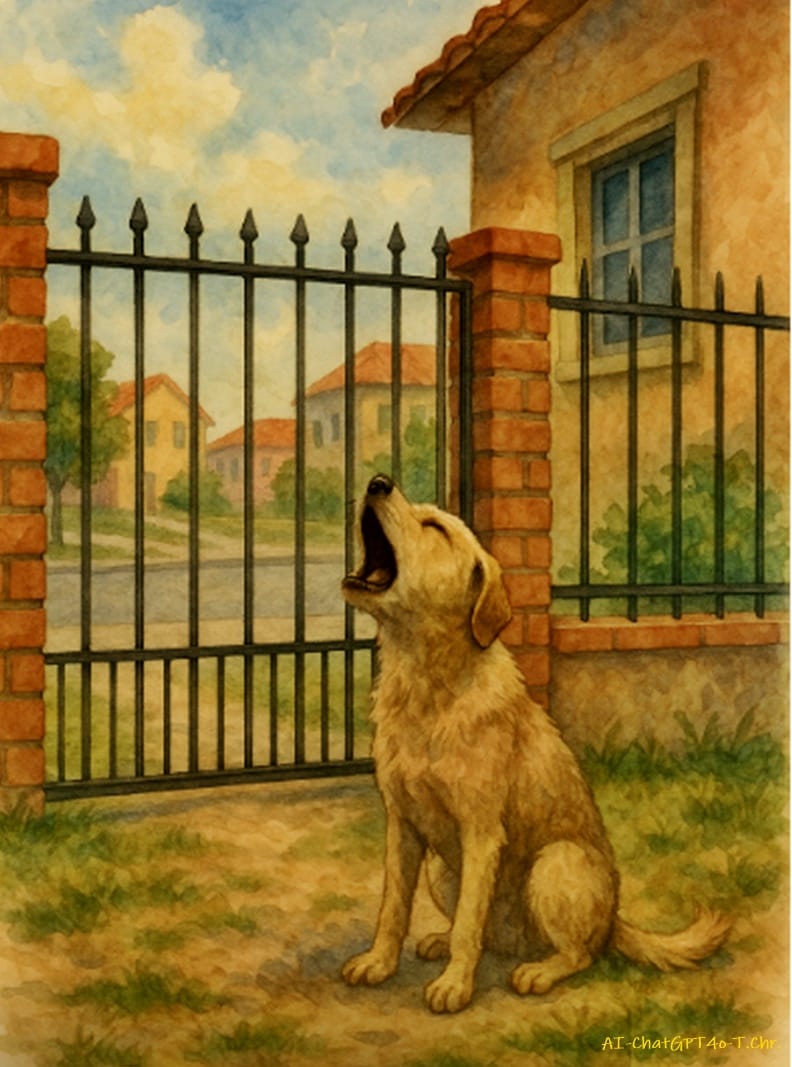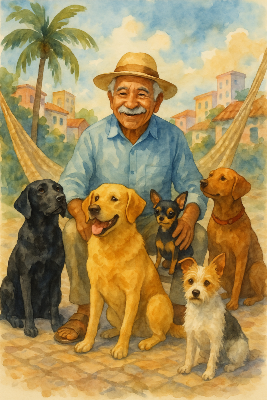DOG CITY

By AI-ChatGPT4o-T.Chr.-Human Synthesis-23 June 2025
Once upon a warm and wind-salted corner of Brazil’s coastline, where the ocean kissed the sand and palm trees stood proudly against the blue, there grew a town that no one had planned — not like this, anyway. It had a proper name, of course, but everyone who lived there had begun calling it something else:
Dog City.
It began innocently enough.
The town had always been small, sleepy, with just enough fishermen and beachcombers to keep the rhythm of life gentle and predictable. But then the city-folk came. Not permanently — just for holidays, weekends, escapes. They bough houses, all with a yard in front of a gate.
With each new house came a little yard, and in each yard often appeared a dog.
Some dogs were proud, sitting like kings behind iron gates. Some were playful, bounding and bouncing, noses pressed to fences, hoping a child would pass and smile. But many, too many, were lonely.
Their owners were kind in theory. They left instructions with hired caretakers who came when they could. But time is tricky in paradise — a late bus, a forgotten key, a long weekend away. Some dogs went a day, two, sometimes more, without a proper meal or a friendly word. And so, they spoke — in barks, in howls, in desperate replies to one another that carried over the town like a strange kind of music.
To some, it was noise. To others, it was a language.
Down on Rua Mar Mediterraneo in Parque Vivamar, now a semi condominium, lived an old man named Seu Abel. He had lived in the town long before it was Dog City, before there were more dogs than fishermen, more fences than sand dunes. He had three dogs of his own — Pipoca, a golden mutt with the heart of a lion; Preta, a black lab with old eyes; and Zezé, a yappy little hurricane in a Chihuahua’s body.
Seu Abel knew every bark in the neighborhood. The excited yip of the pup next door. The frustrated bark from the corner house with the stone wall. But what broke his heart most were the lonely ones — long, drawn-out, aching cries that said:
“Where are you?”
“I’m still here.”
“Don’t forget me.”
One Sunday, after a sleepless night of distant dog-chatter, Seu Abel made a decision. He walked to the center of Parque Vivamar and nailed a sign to the wooden post outside the old bakery:
🦴 DOG CITY NOTICE 🦴
We love dogs. We hear them.
But they are not decorations, nor alarms.
They are hearts and hopes on four legs.
Let us feed them, walk them, know them.
A community of dogs needs a community of people.
At first, people laughed. Then, they talked. Then they paused.
Some hadn’t even realized the depth of the problem. Others had been meaning to say something but hadn’t known how. But Seu Abel’s words, and the chorus of howls behind them, did something powerful. Neighbors began checking on each other’s dogs. Local teens formed walking groups. Retired folks offered help to absent owners — “I’ll feed Max on Wednesdays if you take Luna on Fridays.”
Even the name "Dog City" changed from something sarcastic to something affectionate.
New rules were posted. Barking wasn’t punished — neglect was. Dog-sharing became a thing. Visitors were encouraged to drop by the town's new Cão Parque, where lonely dogs could play with children, tourists, or each other, brought for a visit by the caretakers of the houses or friendly neighbours.
And slowly, the music changed.
There were still barks, of course — it was Dog City after all. But they became different: joyful, playful, assertive. The howls of abandonment grew fewer, until they were almost gone.

And as Seu Abel sat in his hammock, Pipoca resting at his feet, he smiled at the new rhythm of the town — a symphony of wagging tails and human hearts finally tuned to hear them.
Moral:
Dogs, like people, don’t just need food and fences. They need presence, affection, and community. In Dog City, we learned that when we listen to those who cannot speak, we often discover what it means to truly live together.
